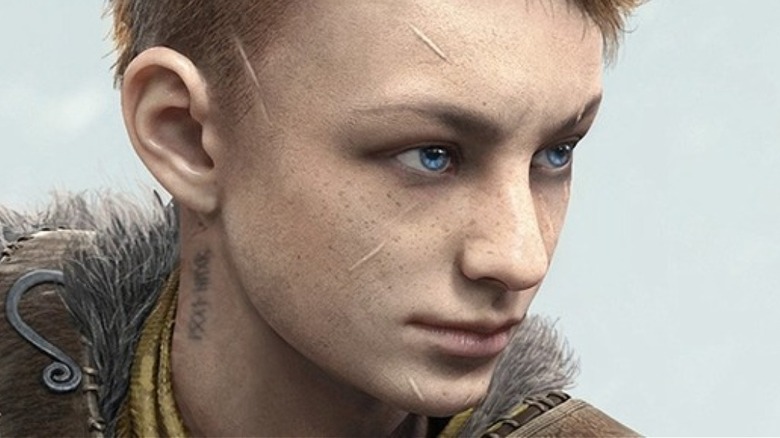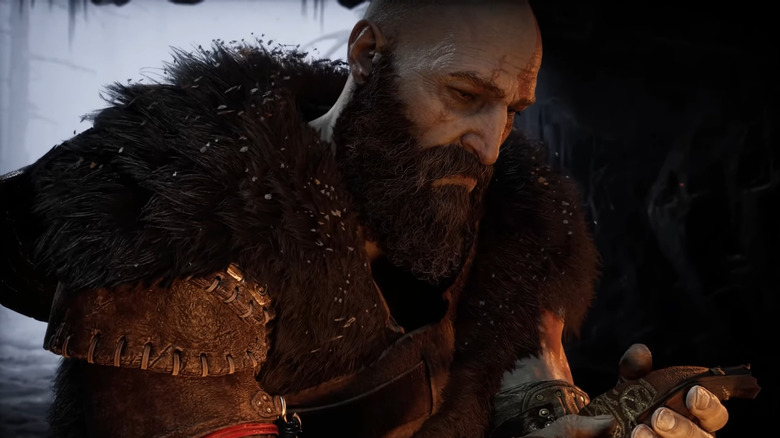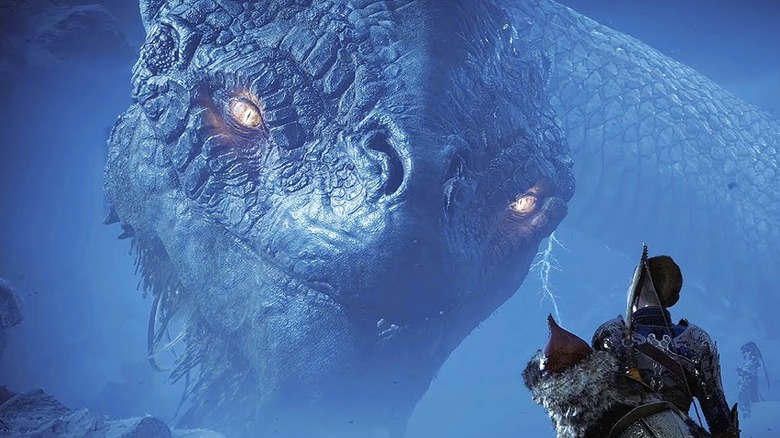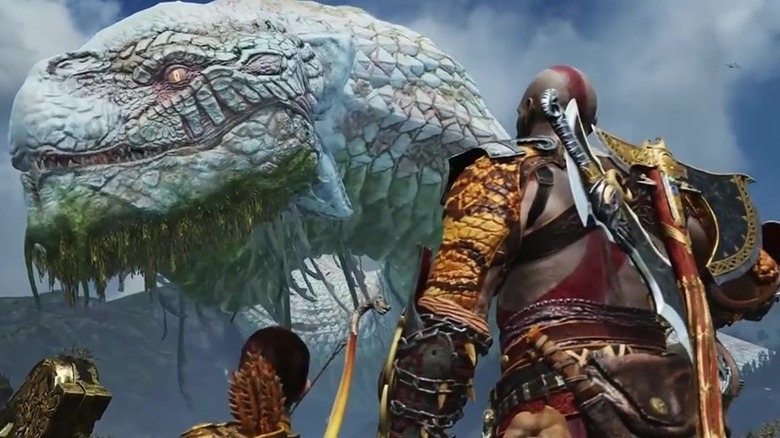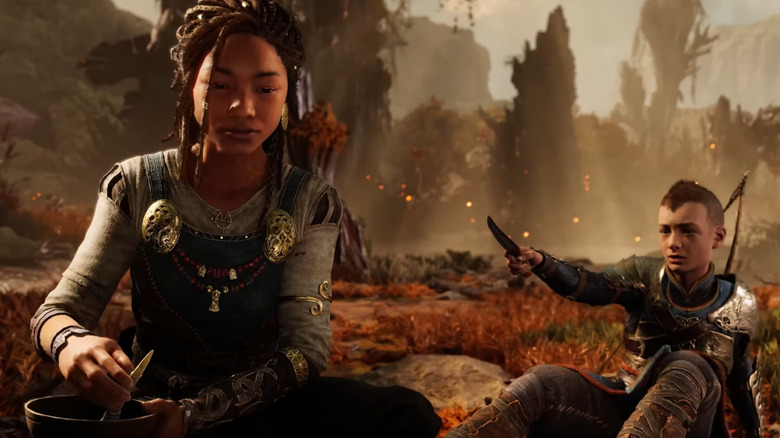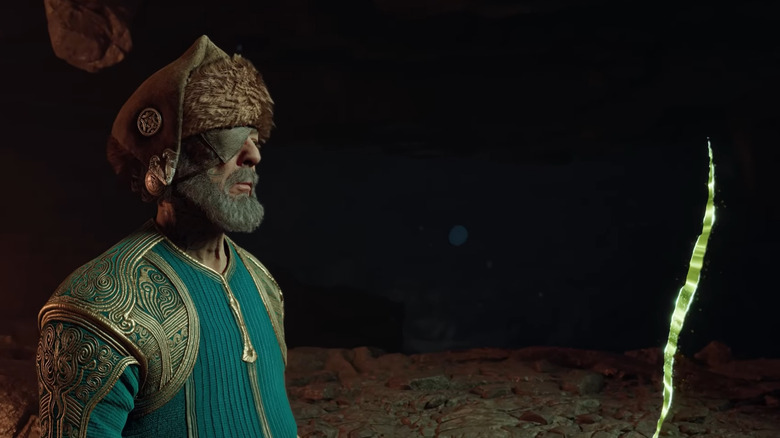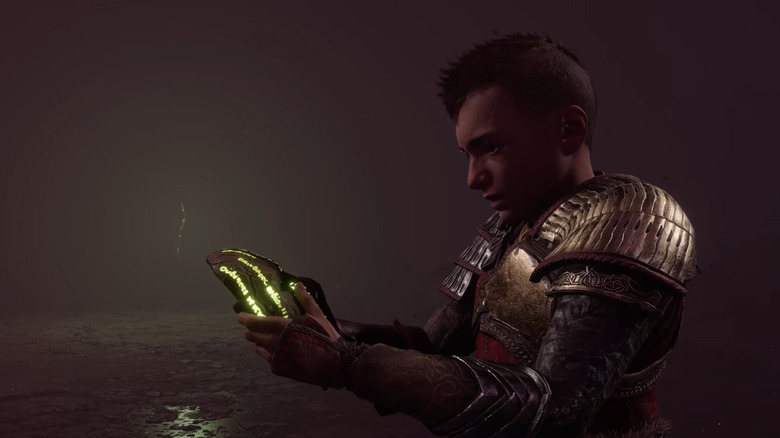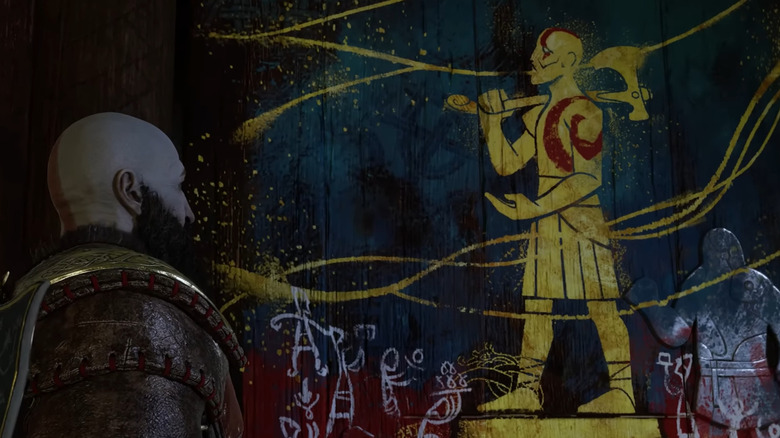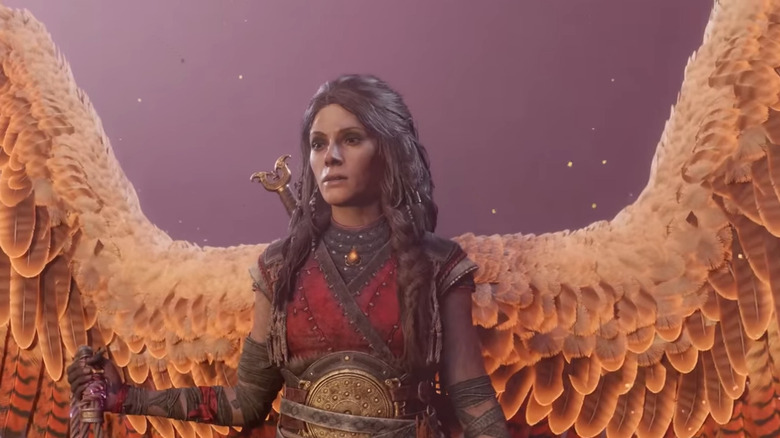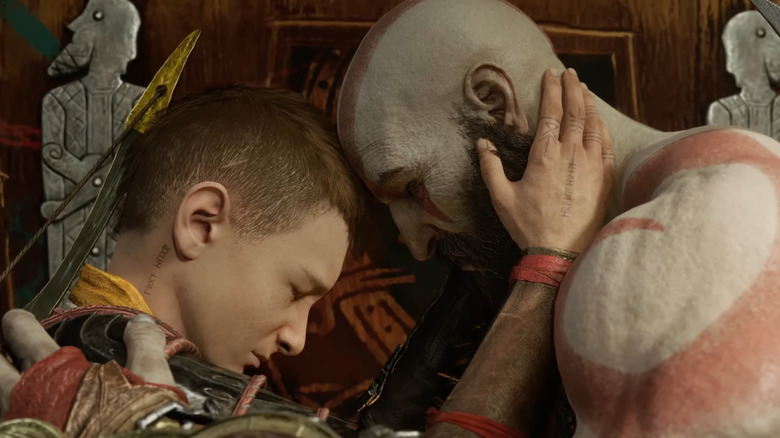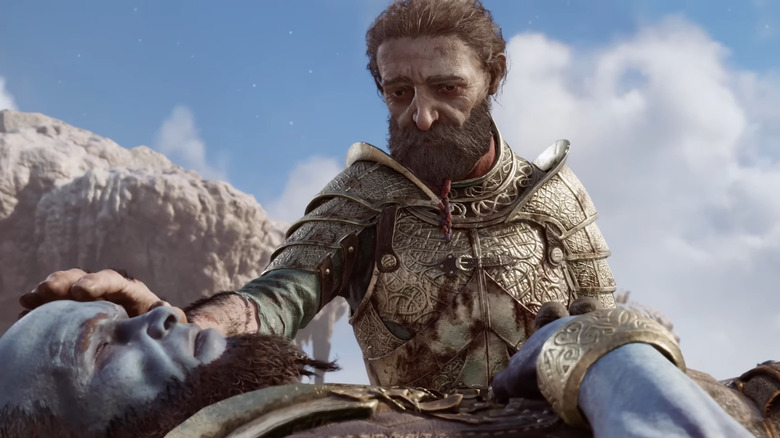Biggest Unanswered Questions After God Of War Ragnarok
"God of War Ragnarok" was one of the most hyped games of 2022, and it does disappoint. The game picks up shortly after the end of 2018's "God of War" and continues the story of Kratos and his son Atreus trying to make a life for themselves in the Nine Realms. They work alongside familiar faces like Freya, Mimir, Brok, and Sindri in the struggle against mighty foes like Thor and Odin, which in turn leads to the titular apocalyptic battle of Norse mythology.
"Ragnarok" doesn't just have a huge number of amazing boss battles, its carefully crafted realms are also packed with small details that nod to Norse myths and Kratos' storied history.
Asgard's days may be numbered, but the ending of "God of War: Ragnarok" is more than likely not the end of Kratos' journey. That's good news for fans, because even though the game tied up many of the plot threads from its predecessor, there are still more than a handful of unanswered questions that fans are dying to see resolved.
Beware of major spoilers ahead for "God of War Ragnarok."
How did Kratos get to Midgard?
Kratos spent the majority of his life in Greece. By the time 2005's "God of War" first introduced him to gamers, he'd fought his way through countless battles and endured horrific tragedies, like the loss of his family. Kratos spent the majority of his life in Greece, and as a grown man he warred against titans and gods alike until the very structures of Olympus crumbled. A post-credits scene in "God of War 3" revealed that Kratos had survived his final battle against Zeus, but the bloody trail he left behind disappeared into the flooded wastes of Greece.
When 2018's "God of War" was finally released, fans weren't as surprised to find Kratos alive as they were to find out where he'd gone after leaving Greece and its godly pantheon behind. In the years between the two games, Kratos somehow managed to travel to Midgard and begin a new life, but the game never revealed how Kratos managed that particular journey across unknown lands and brand new mythologies. Fans were left asking questions and developing theories of their own.
"God of War: Ragnarok" also left the logistics of Kratos' journey to Midgard a mystery. It's possible that the developers simply aren't interested in telling that story. After all, there's not a logical or "real" way for Kratos to travel from one set of mythologies to the next, with or without a gaping wound in his gut. That said, the tale of his travels could one day make for exciting new ground in another "God of War" game.
How and when does the World Serpent travel through time?
Jörmungandr, the World Serpent, plays an important role in both 2018's "God of War" and "God of War: Ragnarok." In the 2018 game, Freya tells Kratos and Atreus that Jörmungandr simply appeared in Midgard one day, but no one knew exactly where he'd come from or why he'd shown up. Jörmungandr stayed in Midgard for ages, sleeping and growing until he was big enough to wrap himself around the entire realm.
In "God of War Ragnarok," Jörmungandr helps Atreus find his way to Iron Wood, which was once the home of the Giants. Once he arrives there, Atreus meets a young serpent and infuses it with the soul of a giant. The serpent eventually arrives to battle Thor during Ragnarok, just as a prophecy said Jörmungandr would do, and during the fight Thor hits him so hard that he disappears from the battlefield. However, it's unclear if this is the moment that another piece of mythology is fulfilled.
Some fans found themselves a bit baffled by the Jörmungandr story thread, with many wondering how the beast eventually got back in time to meet Kratos and his son in the first game. Luckily, Cory Barlog, game director for "God of War" and creative director for "Ragnarok" decided to clear things up a bit on Twitter. He referred to Jörmungandr's journey as a kind of time loop with one pretty significant mystery left to be solved. Barlog wrote, "how he got back in time...well...that's a story for another game."
Barlog is either playing coy, or there really is another "God of War" storyline already in the works. We'll just have to wait and see.
Who blew the horn?
In 2018's "God of War," an unknown character blew the horn that summons Jörmungandr. The mystery of that person's identity was one of the biggest lingering questions from the game. Many fans believed that it was Baldur using the horn and Jörmungandr in his efforts to draw out Kratos and Atreus. Others thought that the mystery figure could have been the spirit of Kratos' wife Faye trying to guide her family in their journey. The one thing fans seemed to agree on was that the game's sequel should provide a definite answer to the mystery.
It didn't. "God of War Ragnarok" cleared up a lot of questions from the previous game and closed almost all of its plot threads, but it never revealed who the mysterious horn-blower was. On Twitter, Cory Barlog seemed somewhat baffled to learn that so many fans were deeply invested in that particular mystery. He also shot down one fan's theory that the sound of Kratos blowing the horn to initiate Ragnarok had traveled back in time to his past self.
This is one unanswered question that truly might not have an answer yet, but Barlog did say, "Keep the faith. One day I will be coherent enough to actually create the moment to answer this." He might just mean that one day he'll make that moment happen in a new game, but it's also possible that Barlog doesn't have an answer yet and needs to think about that moment before fans can put the question to rest.
What actually happened to the giants?
In 2018's "God of War," when Kratos and Atreus finally arrive in Jotunheim, they find the corpses of giants trapped in stone. It seems that none of Atreus' ancestors have survived, but the story of what happened to all of them was left unanswered. Some fans theorized that Odin used his powers to create a sickness that infected the giants and killed all of them off.
"God of War Ragnarok" sheds more light on the story of the giants, but it doesn't fully explain everything. At one point in the game, Atreus arrives in Jotunheim and meets Angrboda, a giantess who seems to have survived whatever killed off all of her people. Atreus eventually learns that the giants hid their souls inside of magical stones as a way to escape Odin's fury.
By the end of the game, fans still don't know exactly what happened to the giants. There's a definite sign that answers are coming, however. At the end of the game, Atreus tells Kratos that he needs to leave on a journey to find any other surviving giants. Assuming he's successful in his journey, the full story of the giants and the tragedy that befell them could be revealed in a future game.
What is the rift between realms?
Odin is the primary antagonist in "God of War: Ragnarok," but he also believes that by working with Atreus, he may be able to prevent more conflict — and even his own death. At one point in the game, Odin reveals his obsession to Atreus. He built his home around a magical rift that he believes is "possibly the birthplace of reality." Odin tells Atreus that he once tried to look into the rift, and he felt something looking back out at him. Whatever it was blinded Odin in one eye, but it also supplied him with strange knowledge that he wouldn't otherwise have been able to access.
Odin's obsession with this mysterious rift between realms is one of the driving forces of the game. However, despite the rift's importance to Odin's motivation, by the time credits roll, very little solid information about it has been revealed. Odin believes a magical mask will let him safely look into the rift, but when Atreus destroys the mask, the rift closes, and any possibility of answers vanish.
Why did the rift appear? Did it really hold the answer to preventing Ragnarok? What looked back at Odin from the other side of the rift, and why did it blind him? These are all burning questions left unanswered by the game.
What was the mask?
The mask, like the rift that's somehow tied to it, is an object of Odin's obsession and a driving force in the game. This mask has been broken into pieces, and Odin believes that by restoring it, he'll be able to safely look into the rift and gain total knowledge of the universe. Atreus also has a mysterious connection to the mask that's tied to his Loki identity. He's able to sense where the pieces are, so he agrees to help Odin piece it together. By the end of the game, the mask and the rift are both gone, and there aren't many answers to be had about either of them.
Hopefully another game will circle back to these concepts, but for now there's a strange connection that might shed some light on what the mask really is. Anthony Burch, one of the game's writers, told Polygon that the game's mask was partially inspired by 1994's "The Mask," which starred Jim Carrey.
Burch said that in the early stages of the story he "had [Atreus and Odin] focusing on some sort of macguffin that represented Odin and Loki's relationship." Because Atreus wants to know more about his true identity, a mask seemed like the perfect macguffin. Burch based the concept and the general design of the game's mask on the one in the aforementioned film. How this may figure into the larger "God of War" story remains to be seen, but its origins are kind of hilarious.
Will Kratos become the Allfather?
By the end of "God of War Ragnarok," the Nine Realms are in a bit of a mess. Asgard has fallen, and Thor and Odin are both dead. There's plenty of rebuilding and healing ahead for those who remain, and it's possible that Kratos ends up taking charge of everything that happens next.
In one of the game's final scenes, Kratos and Atreus discover that Faye chose to hide a mural depicting their fate from them, so they would be able to forge their own path. The two of them changed their destiny, but after Atreus leaves, Kratos makes a startling discovery: There's another prophetic mural on the back of the original, and this one depicts Kratos as an admired leader of the people.
Does this mean that Kratos will certainly take Odin's place as the Allfather? Or, with Odin gone, will people realize that they don't need an Allfather at all? Perhaps Kratos will just become a prominent citizen of the world, helping to lead the Realms into a brighter future. Either way, Kratos seems a bit shocked when he discovers the secret mural, but he's also inspired. He tells Freya and Mimir that he's found a new path for himself, and the three of them agree to help each other rebuild the world as the game closes out.
Will Freya rebuild the Valkyries?
During the events of "God of War," Kratos learns that Odin used a curse to corrupt the Valkyries. Following Odin's curse, the Valkyries provided some of the most brutal boss battles in the game. Kratos slays most of the Valkyries over the course of the game, but there are still a handful left to test the skills of "Ragnarok" players, and the ones who remain have all chosen to work on Odin's behalf.
Freya was once the queen of the Valkyries, and in "Ragnarok," Kratos helps her to regain her title. Near the end of the game, Kratos and Freya work together to defeat the new queen, Gná. After the battle, Mimir asks Freya if she has any interest in reclaiming her position. At first Freya doesn't understand what he's talking about. Now that she and Kratos have finished their work, all of the Valkyries except for her are dead. Mimir isn't discouraged at all, though. He tells her that she could rebuild and potentially use the Shield Maidens to reforge the formidable force that the Valkyries once were. At his suggestion, she seems somewhat hopeful and agrees that he may have a point.
By the end of the game, Freya hasn't definitely made her decision. However, considering that she agrees to work with Kratos and Mimir to rebuild what the destruction of "Ragnarok" took away, there's a strong possibility that the Valkyries will be allied with Kratos in a future "God of War" game.
Will Atreus someday turn against Kratos?
In the middle of "God of War Ragnarok," Atreus agrees to work with Odin to help find the pieces of the mask and potentially reveal information that can stop Ragnarok from occurring. In the end, Atreus turns his back on Odin, destroys the mask, and traps the Allfather's soul in a magical stone. All's well that ends well, but things could have turned out very differently.
Earlier in the game, Angrboda shows Atreus a prophetic mural that depicts the events of Ragnarok — only in this mural, Atreus really does join forces with Odin, and Kratos is killed during the battle. We already know that Faye once prevented Kratos and Atreus from seeing a mural in order to let them choose their own fate, but it's not exactly clear why Ragnarok didn't follow the path of the mural that Atreus and Angrboda saw.
It's possible that some of what Atreus saw will still come to pass. After all, tensions between fathers and sons, not to mention outright patricide, have been a common occurrence throughout the "God of War" franchise. Odin may be gone, but in a world so heavily populated with magical beings and objects, who's to say he can't somehow return in the future? Atreus and Kratos leave each other on good terms at the end of "Ragnarok," though. For now, that might be the best fans can hope for.
What will Sindri do next?
The events of "God of War: Ragnarok" weren't a walk in the park for any of the characters, but poor Sindri the dwarf had a particularly rough go of things. Odin managed to infiltrate the group disguised as Tyr, and when Sindri's brother Brok realized what was happening, Odin killed him. Sindri, wracked with grief, left the group behind because he believed that Kratos and Atreus were ultimately the ones responsible for Brok's death.
After Odin is defeated and trapped in a stone, Sindri gets his shot at vengeance. He smashes the stone containing Odin's soul, presumably destroying the wicked Allfather for good and ensuring that he'll never be able to kill anyone ever again. The revenge does nothing to lessen Sindri's grief, though, and at Brok's funeral, he makes it clear that he still blames Kratos for what happened.
When Sindri walks off at the end of the game, it's unclear what he'll do next. It's hard to imagine that he'll ever return to the kind of weapon-forging work he once did with his brother. There's also a possibility that he might even want revenge against Kratos for his brother's death. If that's the case, Sindri may fall even further in his quest for justice.

